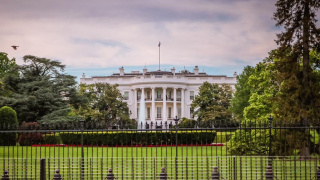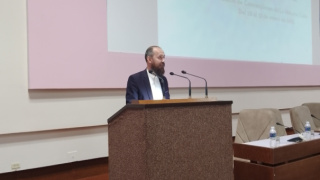Eco-Friendly Business: Neoliberal Environmentalism
There is an apparent paradox linked to the question of environmental apocalypse that needs to be addressed: the dominant logo within the framework of technocapitalism in the new millennium not only fails to remain silent in the face of the dilemma of impending disaster, but elevates it to the object of a hypertrophic discursive proliferation. The environmental and climate emergency is, rightly, one of the most emphatically highlighted and discussed issues in the prevailing discourse today.
This seems, prima facie, a contradiction in terms, considering that raising this dilemma is tantamount to stating the very contradiction of capital, which is its foundation. Would it not be more consistent with the technocapitalist order to conceal—or at least marginalize—this problematic issue, in a similar way to the socioeconomic issue of classism and labor exploitation, which is rigorously excluded from public discourse and political action?
To assert that, unlike the problem of labor exploitation (which remains largely invisible and, in any case, can be easily sidestepped by the dominant discourse), the environmental issue is clear and evident ante oculos omnium—before the eyes of all—and therefore impossible to ignore as if it did not exist, is to make a statement that is true but, at the same time, insufficient: a statement that, moreover, would not explain why the dominant discourse not only openly addresses the issue, recognizing it in its full reality, but even tends to amplify it and transform it into an urgency and a genuine planetary emergency.
The thesis we intend to uphold in this regard is that there is a notable difference between the environmental and socioeconomic issues (which Marx would call, without circumlocution and with good reason, “class struggle”). The latter cannot in any way be “normalized” and metabolized by the technocapitalist order, which in fact operates to ensure that it is never even mentioned (nor, ça va sans dire—needless to say, by the forces of the left wing of politics, long since redefined as the neoliberal left or, better still, “sinistrash”—trash left). Margaret Thatcher, on the other hand, had already ostracized the very concept of social class, dismissing it as a useless and pernicious vestige of communism (in her own words: “class is a communist concept. It divides people into groups as if they were packages and then pits them against each other”).
As has been shown more extensively in our study Demophobia (2023), social rights are replaced in the discursive order and in political action by “rainbow rights” (rainbow rights), that is, by those whims of consumption that, in addition to allowing us to lose sight of class conflict, are intrinsically functional to the neoliberal logic of expanding the commodification of the world of life. And the forces of politics are all reorganizing themselves in the extreme center of the neoliberal grosse Koalition, increasingly appearing as articulations of the single party of turbo-capitalism, which elevates economic fanaticism and classism, imperialism and alienation to an inevitable destiny and exclusive horizon (there is no alternative).
Unlike the socioeconomic issue, the environmental issue can be metabolized and—literally—capitalized on by the technocapitalist order for multiple reasons. Let us make it clear from the outset, however, that the neoliberal discourse confronts and, in fact, amplifies the environmental and climate issue in the very act of declaring it addressable and resolvable only within the framework of technocapitalism, neutralizing a priori the thinkability of any ennobling ulteriority far removed from the prose of market commodification and technology. And in line with this hermeneutic key, we can explain the intensification of neoliberal discourse around the climate and environmental emergency, always characterized by the concealment of the capitalist matrix of disasters.
If properly channeled along the rails of neoliberal globalization, the environmental issue can play an effective role for the dominant order in defocusing attention from socio-economic issues, classism, exploitation, and imperialism. To understand this apotropaic use in all its implications, we can refer, for example, to the 1991 report entitled The First Global Revolution, published by the Club of Rome, an association founded in 1968 by businessman Aurelio Peccei, Scottish scientist Alexander King, and multimillionaire turbo-capitalist David Rockefeller: an entity that can rightly be classified as one of many think tanks (from the Cato Institute to the Heritage Foundation, from the Adam Smith Institute to the Institute of Economic Affairs) at the service of the dominant order, to which they provide ideological training and support.
This is what we read in the 1991 report: “In search of a new enemy that could unite us, we found the idea that pollution, the threat of global warming, the shortage of drinking water, hunger, and other similar situations would serve our purpose.” In short, the green issue will be cleverly identified as a fundamental contradiction and as a “common enemy” capable of treacherously uniting us (a new enemy to unite us) in a battle that, on the one hand, diverts attention from the conflict between Servant and Master and, on the other, leads the former once again to adhere to the program of the latter, notably to the new paths of eco-friendly capitalism as they will be carved out in the years to come.
The Club of Rome report can be accompanied by another document dated two years earlier which, beyond differences in nuance and intensity of approach, proposes a convergent line of thinking. This is a speech delivered by Margaret Thatcher on November 8, 1989, before the United Nations General Assembly. It is animated, between the lines, by the desire to identify a new “common enemy” to replace “real socialism,” which was already in decline (it is significant that the speech by the Iron Lady took place on the eve of the fall of the Berlin Wall). And one that could consequently be taken up as the new global challenge for capitalism, involving everyone in its project. In the words of Thatcher: “Of all the challenges facing the world community in those four years, one has become more apparent than any other, both in urgency and importance: I refer to the threat to our global environment.”
The Iron Lady’s sermon reveals itself, at times, to be even more symptomatic of the new Zeitgeist than the report of the “Club of Rome,” especially in its insistence on the need to address environmental issues without renouncing the imperative of growth, thus preserving capitalism in an eco-sustainable form, yet dedicated to economic growth. Again, in the words of Thatcher, “we need to get things right economically. This means that we must first have continued economic growth in order to generate the wealth required to pay for environmental protection.” The trick—a constant feature of neoliberal discourse—is to denounce the environmental problem, immediately accompanying the denunciation with the recognition that growth, development, and the auri sacra fames—damned hunger for gold—of capital are not the cause, but the possible solution: “We must resist the simplistic tendency to blame modern multinational industry for the damage being done to the environment. Far from being the villains, it is on them that we rely to investigate and find solutions.”
So, following Thatcher’s speech, which sums up the new spirit of green capitalism in statu nascendi –in its infancy–, criticism of capitalism as the cause of environmental destruction (in a word, socialist environmentalism) would be a “simplistic tendency,” due to the fact that multinational industries, “far from being the villains,” are the agents that can conduct research and find solutions to the dilemma. However, the non sequitur in which Thatcher’s reflection is stuck, and with it the very raison d’être of neoliberalism, is that even supposing that multinational companies could find the solution, this cannot serve as an alibi for their responsibility for the genesis of the tragedy, as seems to emerge from the passage quoted above. And, in any case, as we will try to demonstrate, the “solutions” sought and found by the modern multinational industry always move on the basis of the acceptance (and perpetual reproduction) of the contradiction that generates the problem.
Therefore, the hegemonic order admits and even encourages discourse on catastrophe, provided that it is invariably articulated within the boundaries of the technocapitalist cosmos, assumed as an immutable historical a priori or, in any case, as the best possible system both among those that have already existed and among those that could eventually exist as alternatives. The constant evocation of climate catastrophe and the demand for a remedy are therefore permitted and even encouraged, provided that the recipes and solutions are administered by the logic of profit and the maintenance of value as the fundamentum of the production system.
In short, if neoliberal environmentalism is openly promoted and practiced by Western political models—or, to be more precise, by the Uccident—socialist environmentalism is discouraged and demonized, either on the basis of what Fisher has defined as “capitalist realism” (according to which there are no alternatives to what exists), or on the basis of the stigmatization of utopian and anti-adaptive passion, ideologically assumed to be a premise of violence and the return of the atrocities of the 20th century.
In other words, turbo-capitalism raises and debates the issue of the “green apocalypse” by presenting itself as the “solution” rather than the source of the “problem.” In this way, while the ‘causes’ of the catastrophe are being cultivated, it proposes to work on the “effects,” in a perspective that is also functional to the preservation of the logic of capitalism itself. It goes without saying that addressing the environmental dilemma while remaining within the realm of technocapitalism means, at best, not solving it and, at worst (as we believe is actually the case), further strengthening the foundations of the catastrophe.
In particular, we will attempt to show how, in the form of neoliberal environmentalism, the turbo-capitalist discourse on the green apocalypse attempts, on the one hand, to modulate strategies for resolving the catastrophe which, presupposing the technocapitalist order and its maintenance, are all doomed to failure and, on the other hand, to preventively neutralize the viability of the option of socialist environmentalism. Without exaggeration, if the hegemonic logo embraces environmental discourse, it is because of its desire to remove it from the socialist field, redirecting it—and thus “normalizing” it—to the neoliberal terrain, rather than because of any real desire to remedy the impending cataclysm. On the other hand, for the standard-bearers of techno-economic fanaticism—to paraphrase Jameson—it is easier and less painful to imagine the end of the world than the end of capitalism.
There are three main reasons for the discursive hypertrophy of the neoliberal era on the environmental issue, each of which will be analyzed below: a) the transformation of the environmental emergency itself into a source of surplus value, which occurs above all by virtue of the manipulative system of the green economy and its “renewable sources” of business; b) the blurring of the focus on socioeconomic conflict (which, as has been pointed out, cannot be incorporated and normalized into the technocapitalist order, unlike the environmental issue); c) the crisis factory and the government’s use of the emergency, in the form of a “green Leviathan” that uses the crisis itself as ars regendi—the art of governing—to consolidate, optimize, and expand technocapitalist domination over life.
Based on these assumptions, the green economy can be correctly understood as the solution that neoliberal raison proposes for the environmental question, in an attempt not so much to save the planet (and with it, life) from capitalism, but rather to save capitalism itself from environmental and climate impacts. In other words, the green economy aims to ensure that capital can, in any way, overcome its intrinsic contradiction, which translates into the depletion of resources and the neutralization of the “organic replacement” of Marxian memory: in order for this to be possible, the punctum quaestionis—state of the question—leads to the very redefinition of capitalism, according to a new green configuration, which allows it to continue the valorization of value while avoiding recession and postponing the outbreak of contradiction.
The stateless turbo-financial elites are appropriating the growing environmental demands that emerged in the 1970s and have become increasingly solid, diverting them towards the circuits of the green economy, in line with which environmental limits must be perceived not as an obstacle to development, but as an unprecedented opportunity for profit, as a renewed engine of growth and as the foundation of a new cycle of accumulation.
The error underlying the “green economy” and, more generally, neoliberal environmentalism in all its manifestations, can easily be identified in the widespread conviction that the contradiction lies not in capitalism ut sic—as such—but in its functioning, which has not yet been adequately calibrated to find a balance with nature. In short, capitalism is seen as the therapy for an evil that, at best, can be understood as a consequence of the still imperfect application of capitalism itself. Needless to say, what escapes neoliberal raison is that, as Marx and Heidegger have shown, albeit on different bases, it is the very foundation of technocapitalism that consumes beings in their entirety and leads to the exhaustion of nature.
In short, capitalism is not sick, as the heralds of the green economy and neoliberal environmentalism would have us believe: it is the disease. Therefore, what we need is not to cure capitalism, but to cure humanity and the planet of capitalism. This means that social justice and true environmentalism cannot exist outside of anti-capitalism. Attempting to cure capitalism only means perpetuating, in new forms, the system of oppression of man over man and over nature.
The environmental devastation and climate change generated in its image and likeness by technocapital (Heideggerian due to its “forgetting of Being” and its will to power of excessive growth) are transformed, thanks to the green economy, into a phenomenon whereby the cunning of capitalist reason (as we could also describe it, borrowing the Hegelian formula) deceives itself into believing that it can resolve the contradiction, which is now undeniable because it is evidenced by scientific data and everyday experiences.
In other words, since the contradiction is real and evident, and its disastrous effects are already beginning to manifest themselves in the present, the liberal order is working to resolve it by methods that do not call into question the capitalist order itself and that, moreover, allow it to be maintained and even strengthened.
According to the theoretical and practical line opened up by the Stern Report (2006), the green economy devises new sources of profit that, without really affecting the production process, are simply—or appear to be—less harmful to the environment and the climate. Basically, we are advised that we should limit ourselves to doing what we already do, but in a green way. And so, not only does capitalism deceive itself (and us) by pretending to have found the solution to the environmental catastrophe, in whose unfolding it has been a key factor, but it also revitalizes itself and its own logic by changing the assumptions of the mode of production and conquering new markets, inventing new strategies, and promoting the consumption of new “eco-sustainable” goods.
Courtesy: Posmodernia.
Featured: Justitia vanquishes the Seven Capital Sins, by Antoon Claeissens (ca. 1613).
Diego Fusaro is professor of the History of Philosophy at the IASSP in Milan (Institute for Advanced Strategic and Political Studies) where he is also scientific director. He is a scholar of the Philosophy of History, specializing in the thought of Fichte, Hegel, and Marx. His interest is oriented towards German idealism, its precursors (Spinoza) and its followers (Marx), with a particular emphasis on Italian thought (Gramsci or Gentile, among others). He is the author of many books, including Fichte and the Vocation of the Intellectual, The Place of Possibility: Toward a New Philosophy of Praxis, and Marx, again!: The Spectre Returns.











